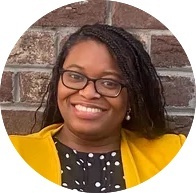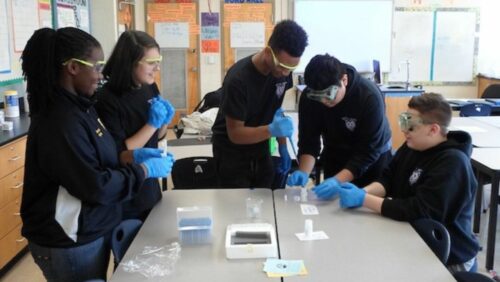Photo: Melody Hawkins’ students working on their competition-winning science experiment that went on to be tested on the International Space Station. Picture credit: Melody Hawkins.
EdReports reviewers are classroom educators, district coaches, and state content leaders who are rigorously selected for their deep understanding of college and career ready standards and the importance of high-quality instructional materials. This Q&A with science curriculum expert Melody Hawkins is one of a series of reviewer profiles in which we’re excited to celebrate some of the 900+ educators who have reviewed for EdReports to date, shining a light on their extensive expertise and dedication to serving students and fellow teachers.

Name: Melody Hawkins
Specialty area: Middle and high school science
Years in the classroom: Six
EdReports reviewer since: 2022
Q: Can you tell me about your journey in education so far?
A: I’m in my tenth year as a science educator. I taught for six years in the classroom, and I’m now an instructional facilitator for my district. I support classroom teachers directly and I also work to provide professional learning to help our educators get the most out of high-quality materials.
Teaching is actually my second career—I started out in lab science, working on oncology testing for women’s health and then in sales for a time. And then I woke up one day and said, “You know, I just really believe that we need to do better about representation in science.” And I’d always felt that way, as a kid growing up and going into college, being one of the few people of color and many times the only Black woman in my classes. It was definitely an important part of my journey to make sure that I was representing the underrepresented communities that are excited and capable and enthusiastic about science.
I was the sole Black woman out of 500 plus lab employees, I’d just become a mother, and I was thinking, “Okay, this is great, but how am I giving back? How am I supporting the next generation of scientists?”
So, I was the sole Black woman out of 500 plus lab employees, I’d just become a mother, and I was thinking, “Okay, this is great, but how am I giving back? How am I supporting the next generation of scientists?” So I decided to leave the lab world, and that’s when I became an eighth grade science teacher. I taught in an urban community in my city that has seen fluctuating assessment results and many students experiencing poverty—all of those different labels that can be placed on a school to signal that life here can be hard for the kids.
Q: How did those experiences and intentions influence your approach to teaching?
A: I definitely walked in with a mission and a vision that I was going to make sure that my students had the best science experiences possible, and that neither zip code nor socio-economic status nor demographic factors would have any bearing on their success. And my students and I, we accomplished some great things.
I definitely walked in with a mission and a vision that I was going to make sure that my students had the best science experiences possible.
In my second year of teaching, I worked on an after school project with five of my students to enter a competition to write an experiment that would be tested on the International Space Station. They were excited because it was fun, but I challenged them to think about something that might make an impact on science for generations beyond. They had become really interested in the Flint water crisis at the time, and they were struck that we lived in the US and yet there are places that don’t have clean water. So they did some research and came up with an experiment to test water purification in a microgravity environment.
It was a huge thing in our community, to see that our students were able to accomplish something so grand.
They submitted it to the competition and got accepted as one of 20 groups in the nation—five 13 year olds from Knoxville who got to go to NASA and watch their experiment go to space. It was huge for them—they’re 20 now, but they still talk about it as if it was yesterday. And it was a huge thing in our community, to see that our students were able to accomplish something so grand. It really began to break down those deficit narratives about what our students might be capable of.
Q: Why do you think instructional materials matter?
A: It’s critical that we hold high expectations for every single student, no matter their background and life experiences. And a key part of those high expectations is using high-quality, grade-level materials that are aligned to college and career ready standards and that set teachers up to attend to the needs of every student.
As a new teacher in an urban community, I knew I needed high-quality materials that gave me a platform to be a curriculum facilitator instead of requiring me to be a curriculum writer.
As a new teacher in an urban community, I knew I needed high-quality materials that gave me a platform to be a curriculum facilitator instead of requiring me to be a curriculum writer. When teachers are focused on meeting the social, emotional, and academic needs of students who might come from high trauma environments, they don’t have a whole extra reserve of time and energy to create or cobble together curriculum from scratch.
Q: How have you experienced the process of adopting and implementing science curriculum?
When I made the decision to teach in an urban school, I wanted to have a seat at the table for as many decisions as possible about what my students needed to learn and be successful. That afforded me a lot of opportunities to learn about how materials are sourced for teachers and what factors go into those decisions. And I learned that it’s vital for teachers to be present and included at all times to ensure that a real-world, classroom perspective is always being centered in those conversations.
It’s vital for teachers to be present and included throughout the materials selection process to ensure that a real-world, classroom perspective is always being centered in those conversations.
In my district’s most recent adoption, I served as part of the team focusing on implementation and professional learning. For students to benefit from the materials you’ve adopted, teachers have to feel ready and confident to use them. They need high-quality, curriculum-based professional learning, both before the materials are implemented and on an ongoing basis after that. So, I worked with a team of teachers to build some of the professional learning workshops and experiences for teachers, so that they could understand how to use the new materials in their classrooms to accommodate every student’s needs.
Q: What makes materials high quality?
A: I truly believe that science is not just about whether or not students understand the periodic table or forces in motion. We’re teaching them how to be critical thinkers, how to find solutions, how to be innovative—and science is the conduit for that. When we use materials that deliver on modern science standards, we’re truly giving our students a well-rounded educational experience to prepare them for the world.
We’re teaching students how to be critical thinkers, how to find solutions, how to be innovative—and science is the conduit for that.
There are so many aspects of quality in materials. One I’d like to call out in particular is representation: giving students materials in which they see their experiences and communities represented authentically and get insight into diverse communities outside of their own. And I’d like to see science materials be very intentional about exposing our students to phenomena and science as they relate to how students experience the world.
For example, there have been injustices in science and medicine that have created distrust amongst people of color, particularly people in the Black community—like the Tuskegee experiments or the experiences of Henrietta Lacks and her family. I’m not sure if this exists already or not, but I would love to see a biology storyline that highlights Henrietta Lacks’ story as one of triumph, telling the truth but in a way that lifts up her name and her voice with beauty and sensitivity. So, students might use her story to work through a solution about a patient experiencing cancer that connects back to and celebrates Henrietta Lacks, her life, and her contributions to science.
We need to help learners understand the stories and journeys of different cultural and ethnic groups when it comes to science—to teach students not only about how amazing they are but how amazing they can be.
We have a lot of room to grow in ensuring we have representation in science and in science materials. We need to help learners understand the stories and journeys of different cultural and ethnic groups when it comes to science—to teach students not only about how amazing they are but how amazing they can be.
Melody Hawkins is a District Science Facilitator for Knox County Schools, Tennessee, and previously served as a high school assistant principal and middle school science teacher. She has received several Teacher of the Year awards including National University Teacher of the Year and has served as an EdReports science reviewer since 2022. She holds two Master of Education degrees, one in Curriculum and Instruction and another in Educational Leadership and Administration, a Bachelor of Science in Biological Sciences, and is currently working towards a Doctorate of Education in Organizational Leadership.
